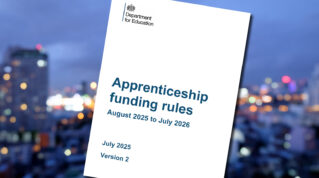A cap on apprentice numbers for small businesses that had caused employers to turn away new starts has finally been scrapped by the skills minister.
Robert Halfon confirmed in a letter to the sector on Thursday that small businesses which don’t pay the apprenticeship levy will no longer be limited to a maximum of 10 apprenticeship starts from April 3, 2023.
In the letter, the minister said businesses will be able to recruit “as many high-quality apprentices as their business needs”, and added: “We want to give smaller employers certainty over funding, and ensure they have access to the apprenticeships they need to meet their ambitions, fill their skills gaps, and grow their businesses.”
The cap has been a point of contention in the sector, with some employers saying they had been forced to turn away new apprentice starts because of it.
Jane Hickie, chief executive of the Association of Employment and Learning Providers said she was “absolutely delighted” the cap is being abolished.
“Each year this causes big issues for smaller employers who wish to take on more apprentices and there is always a lack of transparency over whether the cap will reset or not,” Hickie said.
“This then leads to employers being unable to plan for the future effectively. Last year it took a huge amount of lobbying from AELP and its members to ensure the minister intervened to reset the cap.”
The cap was originally introduced in January 2020 with a limit of three new apprenticeship starts, before it was lifted to ten in summer 2020.
Small businesses that do not pay the apprenticeship levy receive 95 per cent of training costs from the apprenticeship budget, funded by levy paying businesses.
The rationale of the cap had been that it would prevent the overall apprenticeships budget from being overspent.
In April 2021 the DfE reset the cap so that non-levy paying businesses could start up to 10 new apprentices regardless of however many they already had.
Mounting pressure from the sector again last year resulted in the cap being reset once again in June 2022. The DfE at the time confirmed it would keep the cap under review.
To date, small employers who hit the cap had been forced to go down the avenue of requesting levy transfers from larger employers which weren’t using some of their levy funds, as levy transfer funded apprentices did not count towards the cap.
Since taking on the skills, apprenticeships and further education brief for a second time in October, Halfon has made growing apprenticeship starts one of his priorities, in particular pushing for more degree apprenticeship learners.
He told this week’s Apprenticeship Ambassador Network conference that “rules will be removed where we don’t need them” to help SMEs recruit apprentices.
He told the conference that a redesigned registration process will make it “simpler and quicker” for SMEs to take on their first apprentices, with employers able to ask training providers to assist with more of the account administration.
In addition, he voiced ambitions for an easier levy transfer system and plans to double the number of starts on the pathway to accelerated apprenticeship skills bootcamps, so that SMEs could recruit directly off those bootcamps at no cost.

















Not sure about everyone else, but I could count on 1 hand those employers who were cobbled by the 10 apprentices only rule…..in fact I could count on 1 finger any employer I have spoken to who needed to utilise levy transfer as they had exhausted their 10…..I’m not sure that’s what’s putting employers off!
Thanks for your insights Rob. What would you say are some of the things that putting off employers then?